Doronicum
Lepoard’s BaneDarunaj Aqrabi (Unani)
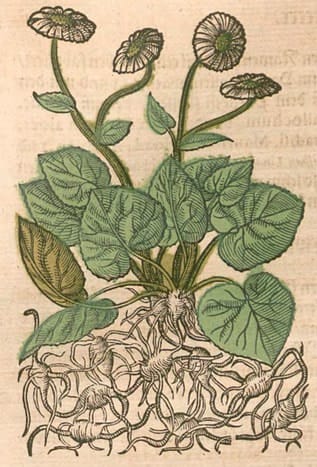 Krauterbuch, Lonitzer, 1578
Krauterbuch, Lonitzer, 1578 |
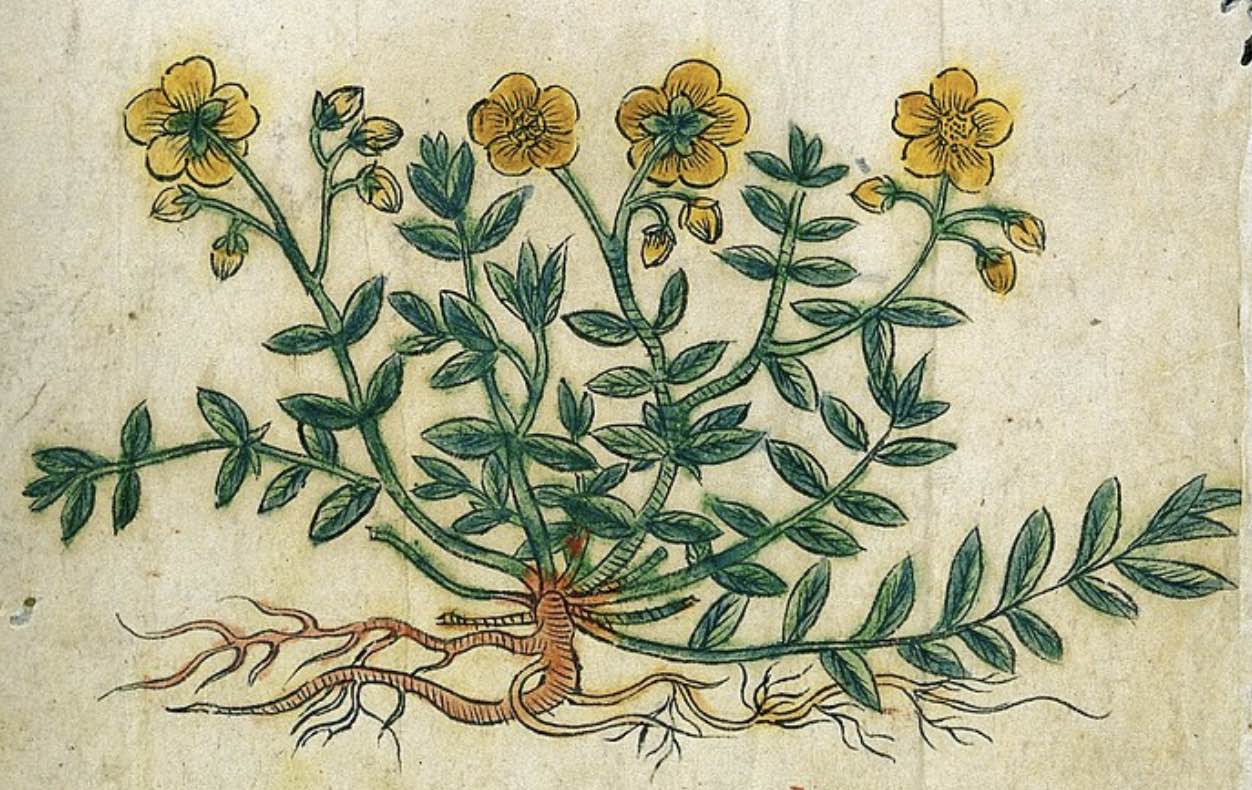 Japanese Herbal, 17th century (Welcome)
Japanese Herbal, 17th century (Welcome) |
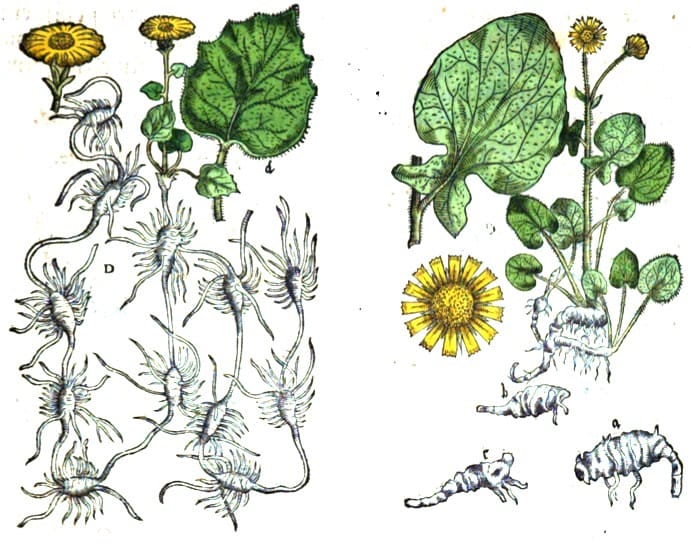 Two varieties of Doronicum
Two varieties of DoronicumKreutterbuch, Matthiolus, 1586
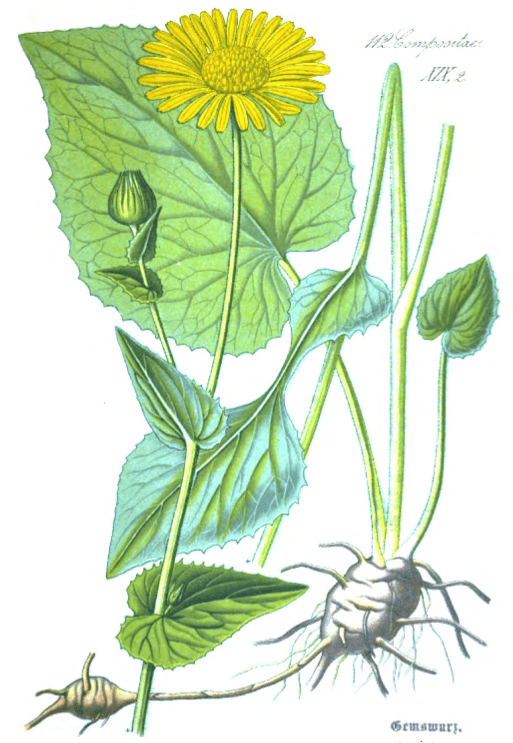
|
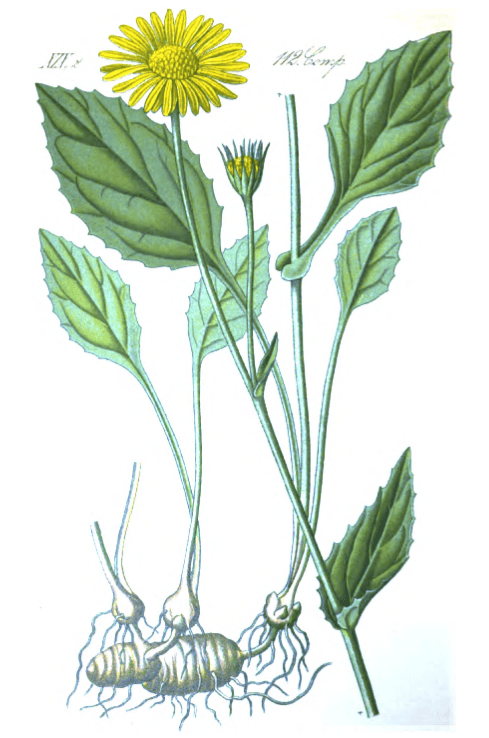
|
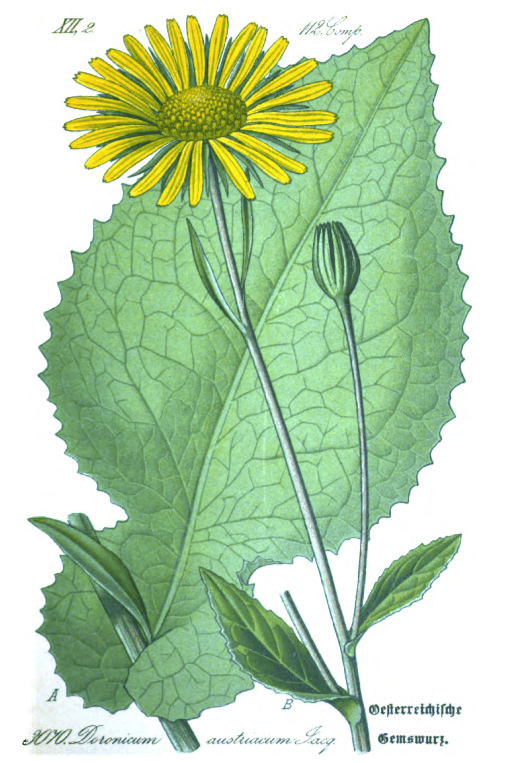
|
|
Doronicum pardalianches |
Doronicum scorpioides |
Doronicum austriacum |
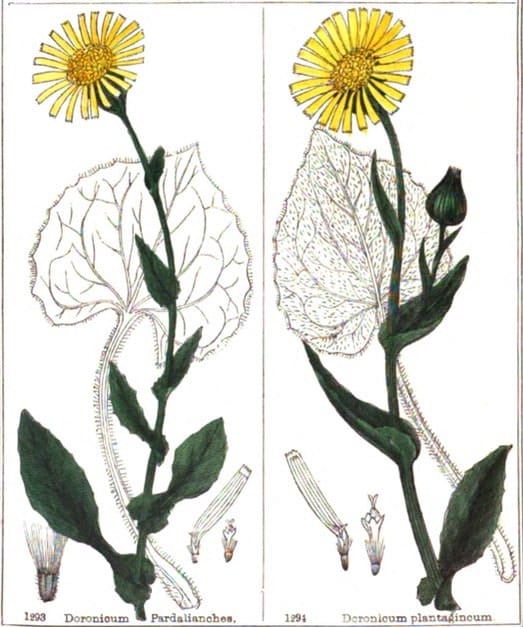 Doronicum paradalianches Doronicum plantagineum
Doronicum paradalianches Doronicum plantagineumFlorigraphia Britannica, Deakin, 1857
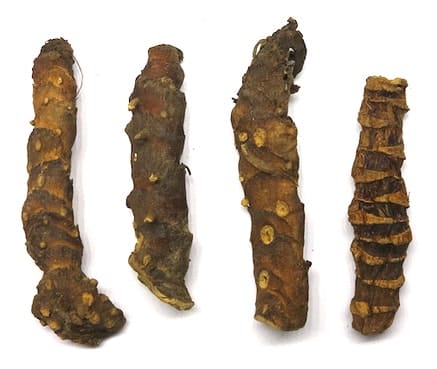 Doronicum root (Calcutta Unani College, Adam, 2019)
Doronicum root (Calcutta Unani College, Adam, 2019)Botanical name:
Doronicum spp.
Various species of Doronicum are known including:
- Greater (Doronicum hookerri; Official variety)
- Lesser
- German (D. austriacum)
- Roman (D. pardalianches, syn. D. matthioli, D. latifolium)
- Plantain-leaved (D. plantagineum)
- Scorpion-rooted (D. scorpioides)
- D. falconeri
- D. macrolepis (Turkey)
- D. orientate (Turkey)
Parts used:
Root
Temperature & Taste:
Very Warm, dry. Pungent, Bitter. Slightly Toxic
“It is Hot and Dry in the Third degree”. (Avicenna)
Classifications:
2D ATTENUATERS OF CONGEALED BLOOD. 2Q. ANODYNE
3C. ALEXIPHARMIC. 3D. CORDIALS & CARDIACS
4c. CARDIAC
Uses:
1. Clears Wind-Cold, Resists Poison:
-resists Poison; good for venomous diseases; protects the Heart from Infection
-those who have ‘taken too much Opium’. (Schroder)
-promotes Sweat, used for Fever
-protects the Heart from Poison
2. Benefits the Heart, Moves the Blood:
-Cordial; strengthens the Heart and Nerves
-‘strengthens the Heart, proves useful in Palpitations’. (Avicenna)
-Exhilarative (Unani); used for Melancholy, Sadness, Depression
-Palpitations; Heaviness of the Heart
-clears congealed blood; bruising, trauma
3. Moves the Blood, Benefits the Uterus:
-good for Wind of the Womb; Uterine Pain, Spasms and Cramps
-Infertility; increases Fertility in man and woman
-it has been used for Threatened Miscarriage
4. Clears Damp, Promotes Urine:
-Edema, fluid retention
5. Kills Worms:
-has been used for Worms
Dose:
Taken with wine to move the Blood.
Powder: 1–3 grams
Comment:
Ming can ser po མིང་ཆན་སེར་པོ་ is the flower of D. falconeri, which is used in Tibetan Medicine. It is used for inflammation of the muscles and upper back pain from Blood and rlung (Wind).
Corrective:
Fennel (Unani)
Substitute:
1. Curcuma caesia, Sphaeranthus indicus, or Zerumbet. (Unani)
2. Delphinium denudatum (Jadwar) was regarded as similar to Doronicum, but stronger in effect. (Avicenna)
3. Angelica, Clove, Galangal and Zedoary have been used as substitutes in Europe.
4. “Zedoary in equal weight and Cloves in two-thirds its quantity may be taken as its substitutes” (Avicenna)
Main Combinations:
1. Migraine, Epilepsy and Vertigo, Doronicum with Gentian and Mistletoe
2. Apoplexy: Doronicum with Rosemary, Costus, Lavender, Siler, Peony, Cinnamon, Clove, Aloeswood, Amber (as in Powder Against Apoplexy)
3. Heaviness of the Heart, Doronicum with Bugloss root and Zedoary (Wirtzung)
4. Palpitations, Heart weakness, Shaking Palsy, and for Infertility and as a tonic during Pregnancy, Doronicum with Pearl, Cinnamon, Mastic, Zedoary, Celery seed, Nutmeg and Red Behen (as in Warming Pearl Powder of Avicenna)
5. To promote Happiness, Doronicum with Cinnamon, Balm, Citron peel, Mastic, Saffron, Peony, Basil seed, Chebulic and Emblic Myrobalans (as in Letificans Almansoris of Rhasis)
6. Pain of the Uterus:
i. Doronicum, Cyperus rotundus, Pennyroyal
ii. Doronicum with Zedoary, Celery seed, Cinnamon, Frankincense (Wirtzung)
7. Infertility, Doronicum with Parsnip seed, Ash tree keys, Red Behen, White Behen, Cinnamon, Rosemary, Pearl (as in Confection for Impregnation)
8. Threatened Miscarriage:
i. Doronicum with Sandalwood, Red Coral, Tabasheer, Bistort and Mastic (as in Powder Against Miscarriage)
ii. Doronicum with Aloeswood, White Sandalwood, Red Coral, Tabasheer, Bistort, Purslane seed, Coriander seed, Armenian Earth, Mastic, Cowry shell (as in Powder Against Miscarriage of Unani)
9. To protect from the Plague and Infectious diseases, Doronicum with Camphor and Delphinium denudatum. (Unani)
10. Poisons and Venomous Bites, plastered on with fig, or taken orally with the same. (Avicenna)
Major Formulas
Powder of Ambergris (Diambra) (Mesue)
Powder of Musk Sweet (Diamoschu Dulce) (Mesue)
Powder Against Apoplexy (1) (Zwelfer)
Powder Against Apoplexy (2) (Zwelfer)
Powder Against Miscarriage (Unani)
Powder to Cool the Heart
Warming Powder of Gems (Mesue)
Warming Pearl Powder (Diamargariton Calidum) (Avicenna)
Troches for Daily Fever (Galen)
Confection for Impregnation (Renodeus)
Electuary for Pregnancy (Unani)
Electuary for Sadness and Worry
Electuary of Gems (Mesue)
Electuary of Pearl (Avicenna)
Electuary to Promote Fertility (Wirtzung)
Letificans Almansoris (Rhasis)
Letificans Conciliatoris
Letificans Cooling Electuary (Unani)
Letificans Electuary of Filius Zacharia
The Great Electuary
Cautions:
1. Avoid overdose. Slightly toxic due to pyrrolizidine alkaloids
2. Use cautiously during pregnancy, avoid full doses.
Main Preparations used:
|
‘D. pardalianches, according to Sibthorp, is called [?] in modern Greek. He identifies it with the [?] of Dioscorides (iv., 75), which that writer describes as having a root like the tail of a scorpion and white like alabaster. Theophrastus (vi. 3. ix. 14) calls it [?] and [?] and Pliny (25; 75) Thelyphonon and Scorpio. The author of the Makkzan-el-Adwiya states that Darunaj is a scorpioid knotted root with a greyish exterior and white interior, that it. is hard, faintly bitter and aromatic. He describes the plant as having fleshy yellowish leaves of the shape of those of the almond, which lie flat upon the ground. The flower stem he says is hollow; it rises from the midst of the leaves to a height of two spans, and bears from 5 to 7 scattered leaves, thinner and longer than the lower leaves. The flower is yellow and hollow. The plant grows in Andalusia and the mountainous parts of Syria, especially about Mount Yabrdrat, where it goes by the name of Akrabi. There are two varieties of the drug, |
Persian and Turkish; the latter is most esteemed. With regard to its medicinal properties, he says that it is a resolvent of phlegm, adust bile, and flatulencies, cardiacal and tonic, useful in nervous depression, melancholy, and impaired digestion, also in pain of the womb, and flatulent dyspepsia. Besides this it is prescribed for persons who have been bitten by scorpions and other venomous reptiles, and is hung up in houses to keep away the plague; pregnant women wear it round the waist suspended by a silken thread which must be made by the wearer; it is supposed to act as a charm, protecting the foetus and procuring a painless delivery. Hung up over the bed it prevents night terrors and ensures pleasant dreams. There would appear to be a demand for it in India, as it is kept by all Mahometan druggists.’ (Pharmacographia Indica, Dymock, 1891) |
2. Anti-Inflammatory and Anti-Oxidant Potential of the Root Extract and Constituents of Doronicum austriacum
3. Antibacterial, antioxidant and enzyme inhibition activity capacities of Doronicum macrolepis (FREYN&SINT): An endemic plant from Turkey
4. Antibacterial and antitumour activities of some plants grown in Turkey
